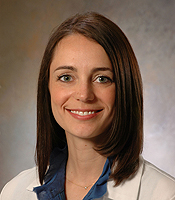07 Dec Cancer Prone Mutations Common In Breast Cancer Patients With Therapy Related Leukemia

Dr. Jane Churpek
MedicalResearch.com Interview with:
Dr. Jane E. Churpek, MD
Assistant Professor of Medicine
Co-Director, Comprehensive Cancer Risk and Prevention Program
The University of Chicago Medicine
Chicago, IL 6063
Medical Research: What is the background for this study? What are the main findings?
Dr. Churpek: We designed this study to try to understand whether damaging, inherited changes in genes known to cause an increased risk of breast cancer are common in those who develop leukemia after getting chemotherapy and/or radiation for treatment of breast cancer.
Leukemias that occur in this setting are called “therapy-related.” This means that chemotherapy or radiation, or both, may have been involved in causing the leukemia. This is an uncommon but serious complication of cancer treatment, and the factors that put women at risk for this complication are not well understood.
We looked at the clinical histories of 88 such women. We found that most of them have relatives who also had cancer, suggesting they may be cancer-prone to begin with. Because we did not have a group of women who had similar breast cancer treatment and who did not get a therapy-related leukemia, we cannot definitively prove that more women with therapy-related leukemia than expected had these mutations. However, this study gives us reason to further study the role of these genes in therapy-related leukemia.
Medical Research: What should clinicians and patients take away from your report?
Dr. Churpek: We found that 1 in 5 women who developed therapy-related leukemia after treatment for breast cancer carried an inherited damaging change in one of the genes associated with increased risk of breast cancer.
Our findings are novel because this was the first time a multi-gene breast cancer panel approach was used to look at many breast cancer risk genes at once in women with therapy-related leukemia after breast cancer. This work is important because it points to the need for bigger studies to examine the role of these genes as risk factors. Understanding the connection between such risk factors and therapy-related leukemia is critical. Breast cancer survivors now make up the largest proportion of cancer survivors getting this often lethal complication and our current understanding of who is at most risk is limited.
They suggest that genetic testing should be offered to all women with breast cancer who develop therapy-related leukemia. A significant proportion will have an inherited mutation that contributed to why they developed breast cancer. This knowledge can be used to guide cancer prevention in those who survive and their relatives.
Medical Research: What recommendations do you have for future research as a result of this study?
Dr. Churpek: They justify a long-term follow-up study of women with and without inherited breast cancer gene mutations who are treated with similar therapy for breast cancer. This would enable us to understand how these genes impact therapy-related leukemia risk and whether specific treatments come with higher risks based on a woman’s inherited genetics.
Citation:
Jane Churpek, Rafael Marquez, Barbara Neistadt, Kimberly Claussen, Ming Lee, Matthew Churpek, Dezheng Huo, Howard Weiner, Mekhala Bannerjee, Lucy Godley, Michelle Le Beau, Colin Pritchard, Tom Walsh, Mary-Claire King, Olufunmilayo Olopade, and Richard Larson. Inherited mutations in cancer susceptibility genes are common among breast cancer survivors who develop therapy-related leukemia. Cancer, 2015 DOI: 10.1002/cncr.29615
Dr. Jane E. Churpek, MD (2015). Inherited Cancer Prone Mutations Common In Breast Cancer Patients With Therapy Related Leukemia
Last Updated on December 7, 2015 by Marie Benz MD FAAD
